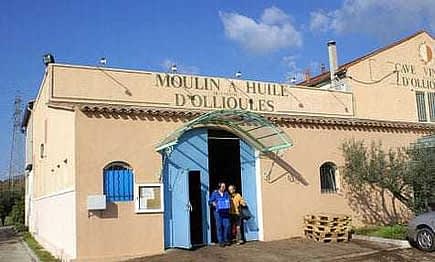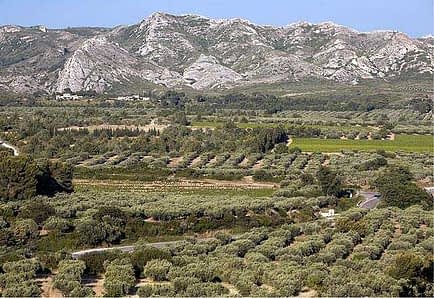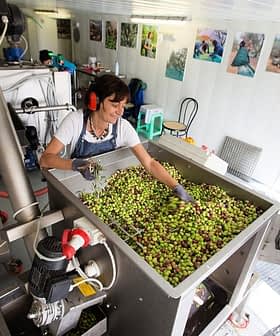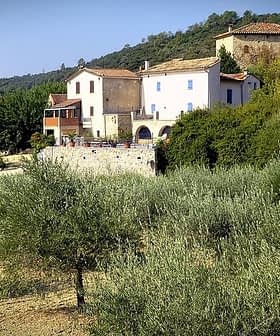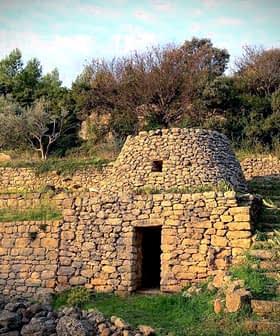Ollioules, a medieval town with a municipality of about 13,000 inhabitants is situated in the heart of the beautiful Haute Provence Cote d’Azur region of France. The name Ollioules comes from the Roman word Oliolis which means olives. Like many other groves in the South of France, the ancient olive trees in Ollioules suffered badly during the glacial frosts of 1956. The owners responded by cutting away the damaged wood. It worked.
The stumps grew again and many trees were saved. Before this traumatic winter, there were 12 olive mills in this historic town.
Today, in Ollioules, there is a cooperative mill dedicated to olive growers and producers of the region.
A very particular species is cultivated here – the Brun variety. The cultivar thrives in this seafront area and the fruité noir (fruity black) extra virgin oil obtained has a distinct spicy taste with hints of green grass and artichoke.
Besides cultivating for their own use, the small producers who bring their olives to the town’s cooperative mill, Cooperative Ollioules, sell their oils online and to a few outlets in the region including a well known hypermarket.
The smallest grower has only a few trees in her garden while the largest orchard boasts about 450 trees. Despite their modest size, the growers are proud to recuperate good quality extra virgin olive oil from their very own trees.
In 2010, 33,600 liters of olive oil was extracted from the 230 tons of olives brought to the mill.
A group of ten volunteers manage the small olive oil mill which is open from November to January every year.
The cooperative has 480 members who each pay a onetime fee of 30 euros. 80 percent of the producers are members.
Growers pay a fee of 0.37 centimes per kilo for processing their olives and those who harvest more than 350 kilos leave with their own extra virgin olive oil.
Olivier Cronel, one of the volunteers said the prices were among the most affordable in the region. He said “the goal of the cooperative is not to make money but to preserve the olive trees in the region. To encourage people to harvest even the two olive trees they have is a true objective. And if they have 300 trees, that’s even better.”
Cronel described some of the concerns facing the members
- Complying with European regulations is not always easy when producing small quantities of oil. Installing stainless steel machines and tanks for example is expensive.
- EU regulations call for strict standard of traceability which might be beneficial for consumers and government authorities, but not always easy for these small scale producers to follow.
- Various taxes have to be paid: Two examples are — The French association, L’association Francaise Interprofessionelle de L’Olive (Afidol) imposes a tax of 0 .14 cents/ kg to the producer for the olive oil he processes at the mill. In addition to that, the mill has to pay Afidol, a tax of 0.01 centimes per kilogram of oil. Then there is the local tax – last year the Cooperative paid 13,000(17,130 USD) euros to the Town Council.
.
Cronel is optimistic about the future. He said it was important to keep the activity running with volunteers. “If we can find young people to maintain the tradition of volunteering, we can keep our costs down and offer cheaper prices for processing which in turn will attract more customers,” he said.
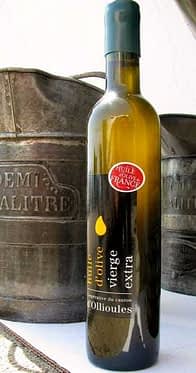
But making money is not the aim for these small producers. These olive growers simply want to provide enough oil for their own use, to enjoy their trees and most especially to preserve their terroir. They are not bothered by colorful posters and information filled labels. Their goal is to preserve the olive trees in the region.
For this dedicated little group of olive oil producers, motivation and terroir are important issues.
The year 2011 was not a very good year for growers in this southern region of France and the Cooperative did not do well. The month of April, the flowering period for olives was extremely dry, the olive fly attacks were rampant in June and July followed by the heavy rains in October. Sadly, they processed only 40 tons of olives.
Cooperative Ollioules was offered help. Did they want to process 100 tons of olives which came from Tunisia and then buy half of the oil? At 0.37 centimes per kilo, this would have upped the profit margin considerably. But the Ollioules Cooperative, loyal to their Provençal l heritage and true to their terroir refused the offer.
I wonder where those olives ended up.

